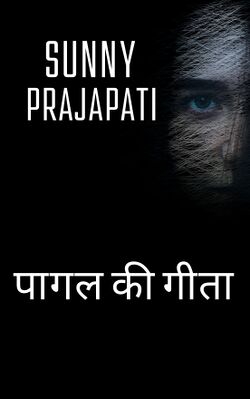Draft:Paagal Ki Geeta
| Draft article not currently submitted for review.
This is a draft Articles for creation (AfC) submission. It is not currently pending review. There are no deadlines as long as you are actively improving the submission. Drafts not being improved may be deleted after six months. Note: The submission-received box will appear at the bottom of the page at first. If it's there, your draft has been submitted correctly.
Where to get help
How to improve a draft
You can also browse Bharatpedia:Featured articles and Bharatpedia:Good articles to find examples of Bharatpedia's best writing on topics similar to your proposed article. Improving your odds of a speedy review To improve your odds of a faster review, tag your draft with relevant WikiProject tags using the button below. This will let reviewers know a new draft has been submitted in their area of interest. For instance, if you wrote about a female astronomer, you would want to add the Biography, Astronomy, and Women scientists tags. Editor resources
Last edited by Ajay Kumar (talk | contribs) 48 days ago. (Update) |
 Book Cover of the Paagal ki Geeta | |
| Author | Sunny Prajapati |
|---|---|
| Original title | पागल की गीता |
| Country | India |
| Language | Hindi |
| Genre | Philosophical poetry, Social commentary |
| Publisher | Shiva Publication |
Publication date | July 24, 2025 |
| Media type | Print (paperback), eBook (Kindle, Google Books) |
| Website | Amazon India |
Pagal Ki Geeta[1] (translated as पागल की गीता[2]) is a Hindi poetry book written by Indian author, filmmaker, and screenwriter Sunny Prajapati. Published by Shiva Publication in 2025, the collection explores themes of existential absurdity, truth, madness, and the deep contradictions of human morality and society. The book has been released as both an eBook and paperback, and is available on Amazon Kindle and Google Books.
Overview[edit source]
Pagal Ki Geeta[1](पागल की गीता) is structured in the style of a modern-day scripture, echoing spiritual dialogues but infused with raw realism and social critique. The poet takes the voice of a ‘madman’ who, instead of insanity, seems to be the only sane voice in a chaotic and unjust world. His verses question religion, blind faith, violence, injustice, and the silence of those in power.
Written in piercing and lyrical Hindi, the poems offer reflections on caste, war, identity, divine betrayal, and philosophical rebellion. The book is framed more like a spiritual-political manifesto rather than a traditional[3] poetry anthology.
Themes[edit source]
- **Philosophical Inquiry**: Blending Eastern spirituality with existential questioning. - **Madness as Truth**: Uses the metaphor of madness to reflect on truth-seeking in a hypocritical society. - **Social Injustice**: Critiques systemic oppression, caste violence, and moral decay. - **Spiritual Rebellion**: Challenges traditional religious doctrines and rituals. - **Poet as Prophet**: The narrator behaves like a wandering truth-bearer, rejected by society.
Reception[edit source]
While niche in its readership, the book has received praise for its boldness and thematic depth. It has been appreciated by independent readers and poetry enthusiasts for its powerful expression and socio-political undertones.
Author[edit source]
Sunny Prajapati (born 25 December 1995) is an Indian screenwriter, director, novelist, and poet, known for his bold, socially charged storytelling that often focuses on psychological depth, marginalized voices, and spiritual introspection. Hailing from Bijauli village in Etawah, Uttar Pradesh, Prajapati has emerged as a distinctive voice in contemporary Hindi and Urdu literature.
His works span multiple media, including film, stage, and literature. He is best known for his books Pagal Ki Geeta, Zismani Bazaar, and Kahne Wale Kehte Hain, each reflecting deep philosophical insight, emotional turbulence, and socio-political commentary. His writing frequently explores themes of women's oppression, class injustice, identity, existential pain, and religious hypocrisy.
Prajapati’s poetic style draws influence from classical Urdu traditions as well as modern free verse. He is widely read on digital platforms[2] like Amar Ujala Kavya, StoryMirror[4][5], and Google Books, and has also developed a notable presence on Amazon Kindle.
As an independent creator, Sunny Prajapati often self-publishes[3][2] through platforms like Shiva Publication House, contributing to the revival of grassroots Hindi and Urdu literature in the digital era.
See Also[edit source]
References[edit source]
- ↑ 1.0 1.1 Sunny Prajapati, Amazon (24 July 2025) [2025]. Nikammi Aulaad (in Hindi). Shiva Publication House. p. 12. ASIN B0DHRXBBHM. Retrieved 5 September 2025.
{{cite book}}: CS1 maint: unrecognized language (link) - ↑ 2.0 2.1 2.2 Sunny Prajapati, Kobo (24 July 2025). Nikammi Aulaad. Shiva Publication House.
- ↑ 3.0 3.1 Sunny Prajapati, Pothi India (24 July 2025). Nikammi Aulaad. Shiva Publication House. p. 33. Retrieved 5 September 2025.
- ↑ Sunny Prajapati, goodreads (24 July 2025). Nikammi Aulaad. Shiva Publication House. ASIN B0DHRXBBHM. Retrieved 5 September 2025.
- ↑ Sunny Prajapati, Storymirror (24 July 2025). Nikammi Aulaad. Shiva Publication House. Retrieved 5 September 2025.